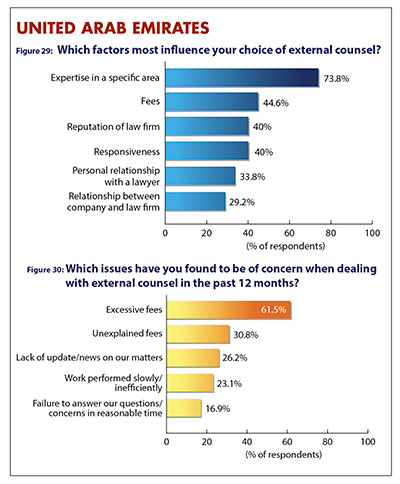 In-house counsel in Financial Services and Real Estate/Construction each had the highest representation with 18.5 percent, the next-highest being Energy/Natural Resources and Technology, Media and Telecommunications, both on 16.9 percent. Team size Most of those surveyed believe their in-house teams will remain the same size over the coming year, with 54.8 percent of this persuasion. A further 37.1 percent assumed their teams would grow, while the remaining 8.1 percent anticipated their teams getting smaller over the next 12 months. Reasons for counsel expecting their teams to remain the same size ranged from recent hires and a good work-to-lawyer ratio, to a steady workflow and trust of external counsel to meet their needs, though some also stated that budget was the cause. Almost all who said their teams would grow said this was simply to keep up with the workflow, while those expecting their teams to shrink do so as a result of less work and less money. Recruitment KEY ISSUES AND CONCERNS “Within the Middle East, finding and retaining qualified and skilled professionals who know the local legal systems and culture” is a problem for many international companies operating in “unpredictable jurisdictions” whilst dealing with “the high cost of lawyers” there. Over the next 12 months, compliance, particularly “with the new Commercial Companies Law”, dealing with corruption, managing costs, and “ensuring colleagues are aware of new regulations and the impact they have on the business” are among the key issues UAE and Middle East regional counsel will be dealing with. Excessive fees (61.5 percent), followed by unexplained fees (30.8 percent) were the two most common drawbacks to hiring external counsel in the UAE over the past 12 months. Lack of updates (26.2 percent) and work performed slowly (23.1 percent) were also hindrances found by many in the In-House Community in the UAE. (Figure 30) Flaws aside, a huge chunk expects to either use external counsel as much (52.5 percent) or more (35.6 percent) over the coming year, with the other 11.9 percent of the opinion that they will use them less. Those expecting to use external counsel about the same amount said this was due to an intended reliance on their in-house capacity, as all of the routine work could be undertaken by the current team and they saw no reason for additional work to be necessary. Some expecting to use outside help more cited dynamic new challenges as a reason, and also noted the diversified work they would be taking on, making expertise in an array of areas a requirement. Another aspect leading to this conclusion was that their business had a reluctance to add to the internal headcount, but still demanded that all work was completed in a timely manner. Cross-border issues, therefore specialisation, was also a reason to expect more use of external counsel. Reasons some expected to use external counsel less included expense, reliance on those in-house and the downturn in the oil and gas industry. |
| Jump to FIRM OF THE YEAR result |
Back to survey home page |

















